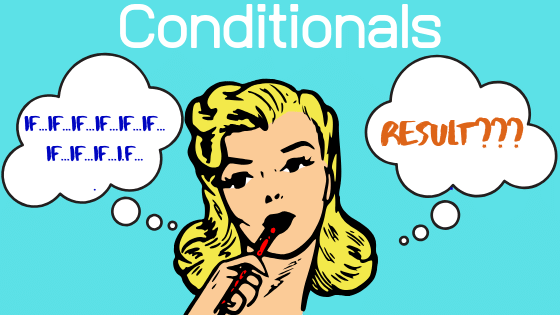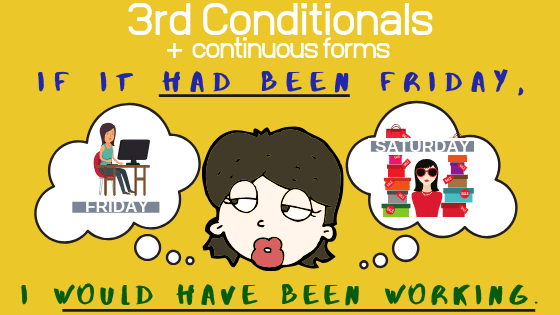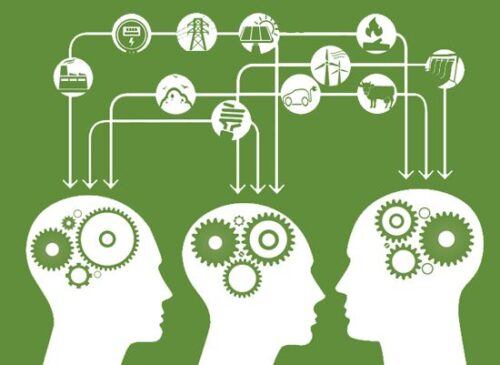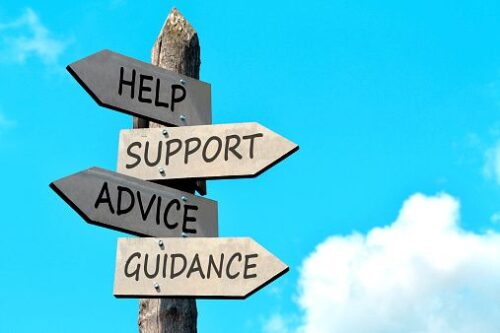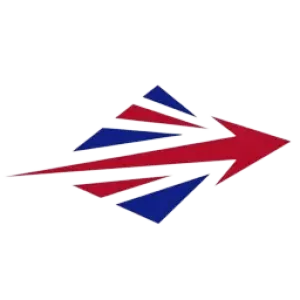We use conditional structures to speculate about things that could happen in the future and things that might have happened in the past. Most conditional sentences in English use the word “If” and describe a condition and the result if that condition is true. Conditionals are formed by using different verb tenses in the condition part of the sentence and the result part of the sentence, depending on the type of conditional being used.
Types of conditionals
There are 4 different types of conditionals, mainly: zero conditional, 1st conditional, 2nd conditional and 3rd conditional; which we use depending on how probable the condition and its result are. They can go from 100% certain: if the condition is true the result always happens, to completely impossible: the result was maybe possible in the past but can’t happen now at all.
See the table below for a rough guide on which conditional to use depending on how probable it is:
| Type | Probability condition will happen |
| Zero conditional | 100% – will always happen. |
| 1st conditional | 50%~90% – will probably happen. |
| 2nd conditional | 1%~40% – can happen, but probably won’t. |
| 3rd conditional | 0%- impossible, can’t happen because in the past. |
In this article we will focus on 2nd and 3rd conditionals. For information on the zero and first conditional structures, you can see our previous post. Second conditionals mainly use present and unreal past tenses and describe present or future situations that are not very likely to happen or situations that now are actually impossible but perhaps were possible at some point in the past.
The 2nd conditional
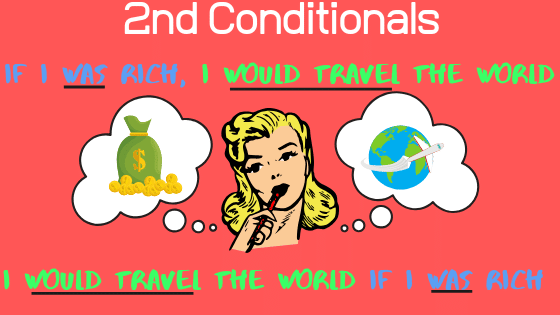
We use the 2nd conditional, as mentioned, for unlikely situations that can but probably won’t happen, as well as hypothetical or imaginary situations both in the present and future. It is formed by using “If” and the simple past tense in the condition part of the sentence, followed by “would” and the bare infinitive (the basic form of a verb without “to,” e.g. to walk). Remember that we can rearrange the two parts of the sentence, with either the condition first and the result after, or the result first and the condition after:
[If + past tense] , + [would + bare infinitive]
[condition] [result]
OR
[would + bare infinitive] (no comma) + [if + past tense]
[result] [condition]
Just make sure you use the correct pronouns so that the subject of the sentence is still clear. For example:
If I was rich, I would travel the world.
[condition] [result]
OR
I would travel the world if I was rich.
[result] [condition]
Here, the meaning is that the person speaking isn’t rich now, and believes that becoming rich is possible but probably not going to happen, it is an imagined/hypothetical situation.
Using “I were” instead of “I was” in the 2nd conditional
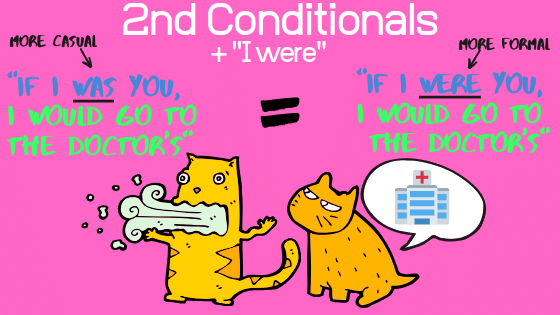
Note: When “I” is the subject we often use “I were” in conditional sentences as opposed to “I was,” especially when writing, as it sounds more formal. For example:
If I was you, I would go to the doctor’s
[condition] [result]
OR
If I were you, I would go to the doctor’s.
[condition] [result]
(Note: The meaning of the sentence with “I were” is exactly the same as the sentence with “I was”.)
Using other modals instead of “would” in the 2nd conditional
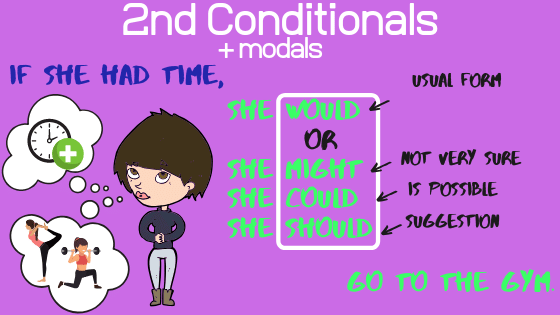
Note: It is also possible to use other modals such as “could,” “might,” and “should” in place of “would” in the 2nd conditional. Changing the modal changes the degree of certainty or the tone of the sentence, with “might” being not very sure, “could” being about 50/50 and “should” being used for making suggestions. For example:
Using the continuous form in 2nd conditionals
Note: It is also possible to use the continuous form to talk about unfinished or continuous actions /states that would result from the improbable/hypothetical conditions described by 2nd conditional sentences. The structure is the same in the condition part with “If” followed by the simple past, while the result part takes “would” followed by “be” and the verb in the continuous form:
[If + past tense] , + [would + be + verb-ing]
[condition] [result]
OR
[would + be + verb-ing] (no comma) + [If + past tense]
[result] [condition]
For example:
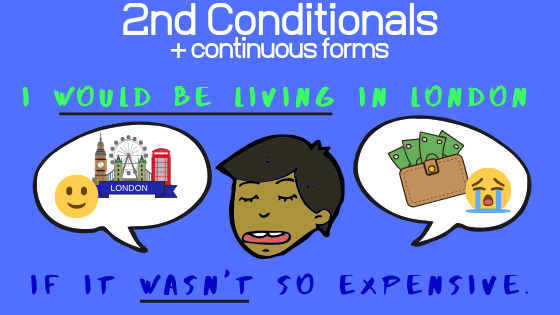
Here, the action of living in London would have started in the past and would still be continuing now if the condition was true, which, unfortunately, it isn’t, as living in the capital usually costs a lot of money.
The 3rd conditional
Finally, we use the 3rd conditional to talk about things that were possible in the past, but that didn’t happen or can no longer happen now, which means they are actually impossible/ unreal events. It is formed by using the past perfect tense in the condition part of the sentence, followed by “would” and then the present perfect tense in the result part. As before, these parts can be swapped around:
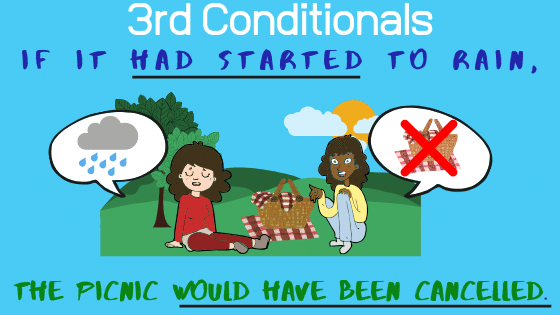
[If + past perfect tense], + [would + present perfect tense]
[condition] [result]
OR
[would + present perfect tense] (no comma) + [if + past perfect tense]
[result] [condition]
For example:
If it had started to rain, the picnic would have been cancelled.
[condition] [result]
Here, in reality, it did not rain and the picnic was not cancelled, but there was a possibility of this potentially happening in the past.
Using the 3rd conditional to express regrets
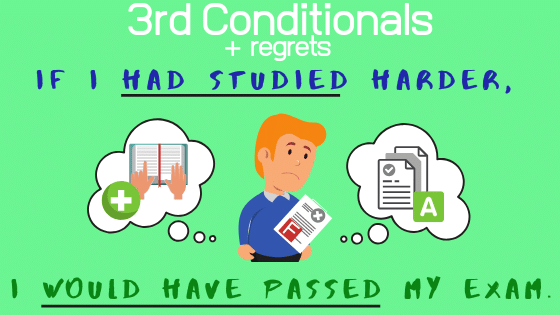
Note: Since the 3rd conditional deals with situations that could have but didn’t happen in the past, it is often used to talk about regrets or things we wish had happened differently. For Example:
If I had studied harder, I would have passed my exam.
[condition] [result]
Here, the speaker could have studied harder and the result could have been passing his exam, but in reality, they didn’t study so much and they didn’t pass. It is too late for this condition to become true.
Using “- ‘d” for “would” and “had” in the 3rd conditional
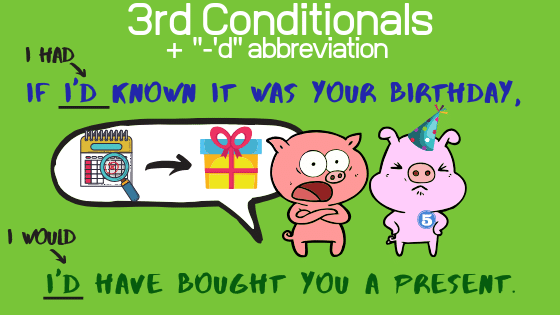
Note: In English, we often abbreviate words especially when speaking casually. Both the words “would” and “had” can be abbreviated to “- ‘d” ( apostrophe + “d” ). This can be confusing when it occurs in the 3rd conditional which uses both words in the same sentence. To help you decide which word “- ‘d” is referring to, remember that:
- “would” never appears with “if” in the condition part of the sentence. If you see “- ‘d” after “if” it must be the abbreviation of “had”.
- “Had” can never be before “have”. So if you see “- ‘d” before “have” then it must be the abbreviation of “would”.
For example:
(I had) (I would)
If I’d known it was your birthday, I’d have bought you a present.
[condition] [result]
Using other modals instead of “would” in the 3rd conditional
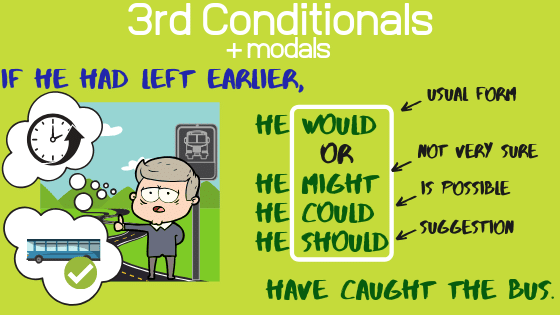
Note: It is possible to use other modals such as “could,” “might,” and “should” in place of “would” in the 3rd conditional as well. Changing the modal changes the degree of certainty, with “might” being not very sure, “could” being about 50/50 and “should” being very sure.
For example:
If he had left earlier, he would have caught the bus.
[condition] [result]
OR
If he had left earlier, he might have caught the bus.
If he had left earlier, he could have caught the bus.
If he had left earlier, he should have caught the bus.
[condition] [result]
What’s your English level?
Find out by completing one of our level tests!
What’s your English level?
Find out by completing one of our level tests!
Using the continuous form in the 3rd conditional
Note: The continuous form can also be used in the 3rd conditional to talk about unfinished or continuous actions /states that would have resulted in the past, from possible past conditions that didn’t actually happen. The structure is the same in the condition part with “If” followed by the past perfect, while the result part takes “would” followed by the present perfect continuous form:
[If + past perfect tense] , + [would + have been verb-ing]
[condition] [result]
OR
[would + have been verb-ing] (no comma) + [If + past perfect tense]
[result] [condition]
For example:
OR
I would have been working if it had been Friday.
[result] [condition]
Summary of 2nd and 3rd conditional structures
In summary, 2nd conditionals can happen but there are low chances they will, whereas 3rd conditionals can’t happen, as they are in the past and now impossible. Compare the difference in meaning in the examples below:
If he invited me, I would go to his party (unlikely but still possible).
If he had invited me, I would have gone to his party (in the past – impossible).
In the 2nd conditional, the sentence describes that going to the party can happen but the speaker doesn’t believe there is a high chance they will be invited. In the 3rd conditional sentence, the reality is that the speaker was not invited and did not go to the party, although it was possible in the past.
2nd and 3rd conditional structures in songs
Conditionals are used all around us, especially in music, here are some songs that use some of the conditional structures we have seen above, but there are many many more, can you think of any English songs you like that also use 2nd and 3rd conditionals?
Cher – If I could turn back time
Jennifer Lopez – If You Had My Love
Vikings Theme song- If I Had A Heart
We also have a blog post to show you how to use conditional structures.

This article was written by Break Into English’s blog contributor Ilaria Marazzina.

